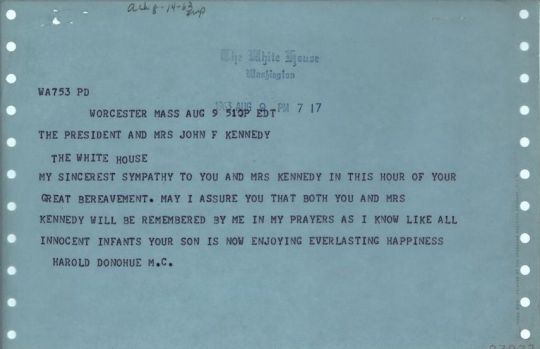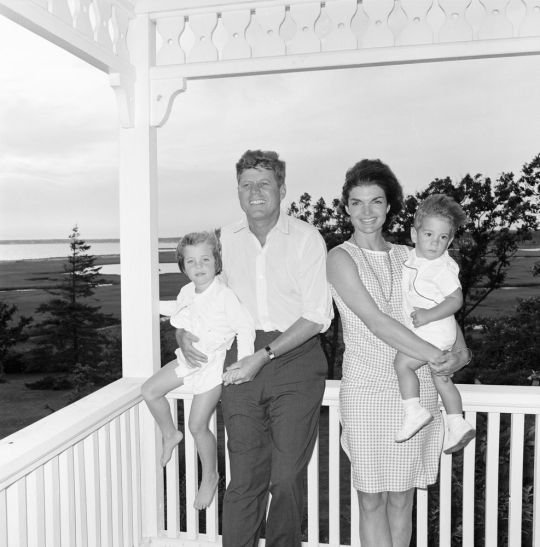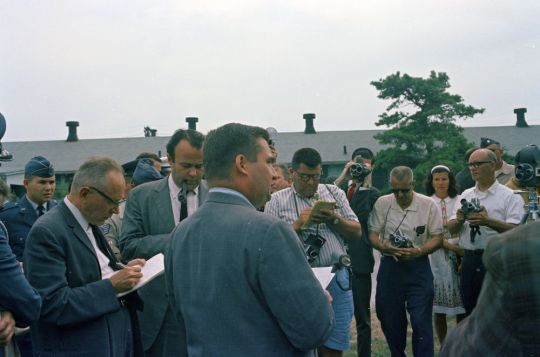#ReflectionsOnLoss
Explore tagged Tumblr posts
Text
#ReflectionsOnLoss

Condolence telegram from Rep. Harold Donahue. JFKWHCSF-0707-014-p0002
cw: death of a child
On August 7, 1963, First Lady Jacqueline Kennedy gave birth to a baby boy, who she named Patrick Bouvier Kennedy. He had been born 5 ½ weeks prematurely, and it was soon discovered that he suffered from a lung ailment called Hyaline Membrane Disease (now also known as Respiratory Distress Syndrome). At the time, the rate of survival was 50/50. Patrick was rushed to Boston Children’s Hospital, where doctors attempted to save his life and President Kennedy stood watch over him. He died two days later on August 9; news of his death traveled across the globe, and people throughout the world sent their condolences to the First Family.
While available records at the JFK Library don’t give us first person accounts of what the President and First Lady felt through the birth and loss of their child, interviews with family and friends and other associates who were there give us a glimpse in the private grief of a public family.

Kennedy family in Hyannis Port, August 4, 1962. ST-22-1-62
Pamela Turnure (press secretary to Mrs. Kennedy) on the private side of the Kennedy family and the public nature of Patrick's’ death (link)
...Up to then even though there had been quite a few candid pictures of the Kennedy family together and some idea of what they were like as a family, that basically they had a marvelous reserve and they never wanted to sort of flaunt themselves as a family and show their innermost feelings for one another.
When this happened, for the first time the inner life of the family became terribly open to the world, and what the President particularly and Mrs. Kennedy particularly felt for one another became apparent to the world, and this was something that people who admired them as a head of state and his wife, had really never known what they were like as a family until this moment. Suddenly it was all in the open, and the President’s real devotion to Mrs. Kennedy and to the children—all of it—was a new side that had never been seen so microscopically before.
Nancy Tuckerman (social secretary to Mrs. Kennedy) and Pamela Turnure on President Kennedy’s reaction to Patrick’s birth (link) Tuckerman: He sat, I think for one whole night in this chamber that they placed the baby in—by the baby—he sat there with the baby until he died, I believe, or until they knew it was absolutely hopeless. And then he—well what an emotional time to go through anyway—suddenly to be called on the phone and told she was going to the hospital—and at that moment really not knowing whether her life was in danger—the trip up—you know, he was very—I remember going up on the plane—he was... Turnure: He was very withdrawn at that time. He just kept sitting and staring out of the window, and obviously his thoughts were completely with her, and it was a very quiet trip—getting there as soon as possible—rushing to the hospital—and... I had seen that look once before. It was time again back to when John was born. I remember that look on his face when he got the word, “Come back.” They had been through some terrible, terrible times together, and I think this was the first time the international public saw him as a President with family tragedy...
Janet Auchincloss (Jacqueline Kennedy’s mother) on President Kennedy’s concern for the First Lady (link)
I remember his saying to me in the hospital in Boston that day, when Patrick was in the little incubator and then before we went down in the iron lung room, which they tried as a last resort to help his breathing, I remember his saying to me... “Oh, nothing must happen to Patrick because I just can't bear to think of the effect it might have on Jackie.” I could see the effect it might have on him, too.

Press Secretary Pierre Salinger (in profile) briefs the press, August 9, 1963. ST-A6-1-63
Nancy Tuckerman and Pamela Turnure, on the lack of privacy at the hospital (link) Tuckerman: I remember thinking how terrible it was that they had no privacy even in the face of tragedy, because the press was—there were so many of them just standing outside the hospital door—like vultures, waiting for some kind of a message that we couldn’t possibly open the door to go for a walk because they would just descend upon you.
Turnure: Well, that’s part of American life though and then being the President of the United States and that—I don’t think it could have been handled any other way... If she had said, “I cannot go through with it,” then it would have been done some other way. But she said, “Yes, I can do it.”
Maud Shaw (nurse to Caroline and John Jr.) on the children’s awareness of their brother’s death (link)
[W]e had told the children they were going to have a brother or sister and then they had to be told that their brother was not coming home - that he had been sick and he had gone to heaven. I saw a part of the President I had never seen before. I had always thought him a very good father but my opinion since then that he should have had a large family, that he proved himself a wonderful father. The concern about his child' s birth and illness and death was really astounding to me...
He told Caroline what had happened. To John he had said that the baby wasn't coming home. But John was not old enough to take in too much. But Caroline was very concerned about it
Cardinal Cushing (Roman Catholic Archbishop of Boston) on the funeral Mass held for Patrick (link)
Only the members of the family were present. Jacqueline was too sick. Cardinal Spellman came from New York...There was nobody else outside of myself and the family. All the family arrived for the services in helicopters. They landed in the ball field of the seminary. I wrote a special prayer that I gave to Jacqueline after I read it at the end of the Mass. Then they all filed out, and for the second time I saw tears in the eyes of Jack Kennedy, and they were copious tears. He was the last of the family to leave the little chapel. I was behind him. The casket was there. It was in a white marble case. The President was overwhelmed with grief that he literally put his arm around that casket as though he was carrying it out. I was right behind him. I said, “Come on, Jack. Let’s go. God is good. We’re only about ten minutes from the cemetery.”... A few moments after our arrival at the grave, the casket that had been placed in a bronze container was gently, silently, and devoutly placed in the bosom of the earth.

Clint Hill (2nd from right) outside hospital with other Secret Service agents, August 9, 1963. ST-A6-3-63
Clint Hill (Mrs. Kennedy’s Secret Service Agent) on Patrick’s birth and the aftermath (link)
They put [Mrs. Kennedy] in a helicopter and brought her to Otis. I raced to Otis by car. I got there about the same time. And Dr. Walsh came, and she delivered a little boy. They named him Patrick Bouvier Kennedy. He developed serious lung problems. And they decided that they’d have to transport him to Boston.
In the interim, the president was in Washington at the White House. So we notified him what was going on... He came right to the hospital to see her. And we had taken Patrick by that time to Boston. Agent Landis had gone with him. And then, the president went to Boston to be with Patrick. They didn’t, at first, think it was going to be that serious. But turned out, it was very serious, and he died two days later...
I stayed at Otis Air Force with her. The president came and told her what had happened. The funeral was held in Boston... She was not able to go because she was at Otis in the hospital.
And she went into a very deep depression. She was very upset. And it was decided that maybe she needed to get away for a while. And so, it was arranged for her to go to Greece and go on a cruise.
#ReflectionsOnLoss#ChildLossAwarenessDay#JacquelineKennedy#JohnFKennedy#PatrickBouvierKennedy#OralHistories
23 notes
·
View notes